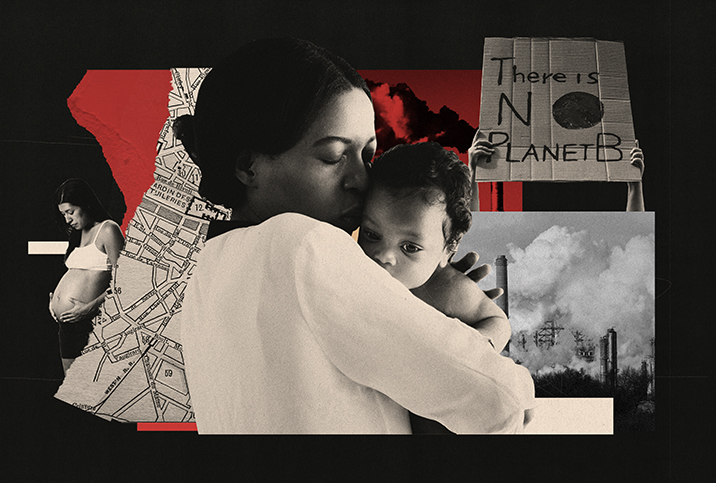What Is Reproductive vs. Sexual Health?

Reproductive health is not just about your reproductive system. It encapsulates much more and covers all life stages for both men and women.
Defining reproductive health is more difficult than you would think, said Evan Rosenbluth, M.D., a reproductive endocrinologist with the Reproductive Science Center of the San Francisco Bay Area.
"Probably the best way to describe reproductive health is that it represents the state of our reproductive systems throughout our entire lives," Rosenbluth said.
For instance, he said going through puberty, menstrual problems, erectile dysfunction (ED), infertility and menopause are all aspects of our reproductive health.
Other aspects of reproductive health include the following:
- Reproductive health conditions for all genders
- Hazards and risks that affect reproductive health
- Fertility, infertility and assisted reproductive technology (ART)
- Contraception and safe sex
- Sexually transmitted diseases (STDs) and infections (STIs)
- Family planning and conception
- Abortion, miscarriage and stillbirth
- Maternal and infant health
- Maternal and infant mortality
- Depression, mental health, antenatal and postpartum depression
- Pleasure, autonomy, respect and consent
- Recommended health screenings
The World Health Organization (WHO) defines reproductive health, in part, as "the state of complete physical, mental and social well-being and not merely the absence of disease or infirmity, in all matters relating to the reproductive system and to its functions and processes."
"Basically, reproductive health encompasses the function of the reproductive system itself—both external and internal reproductive organs," said Sara Mucowski, M.D., a reproductive endocrinologist and OB-GYN at Dallas IVF.
This includes the body's ability to make functional gametes that result in fertilization and development into an embryo capable of implantation in the womb, which can support fetal development and allow for a healthy pregnancy and delivery.
However, Rosenbluth said we also need to consider the state of our social and societal environment, since these factors greatly contribute to our ability to choose when, if, and how often we want to reproduce.
What is the difference between reproductive and sexual health?
Sexual and reproductive health are intertwined. While reproductive health encompasses the function of the reproductive system itself, sexual health includes well-being in relation to sexuality—both mental and physical components, Mucowski said.
Sexual wellness is more than just the absence of disease or dysfunction and includes a respectful approach to sexuality, sexual relationships, sexual healthcare, sexual desire and pleasure.
"Furthermore, sexual health issues may include those involving sexual orientation, gender identity and access to safe sexual experiences free of coercion, violence and discrimination," Mucowski said.
Sexual health also includes knowledge of potential negative consequences and strategies for prevention, treatment and support, such as STIs, unintended pregnancy and sexual violence.
"Our bodies, minds and society all contribute to sexual health," Rosenbluth said.
Facts, stats and studies about reproductive health
To reiterate why looking after reproductive health is essential, let's look at 10 current statistics in the United States.
- Around 1 in 6 couples are affected by infertility.
- More than a million adults and adolescents are currently living with HIV (the figure was 1,070,604 at the end of 2020).
- One in 4 women will end a pregnancy in her life through abortion, 24 states have banned abortion or are likely to do so.
- Data collected in 2017 and 2019 from 45 jurisdictions showed 76.2 percent of women ages 18 to 49 years were at risk for unintended pregnancy.
- Chlamydia, gonorrhea and syphilis cases continue to increase, reaching more than 2.5 million diagnoses in 2021.
- Polycystic ovary syndrome (PCOS)—a common cause of female infertility—affects 6 percent to 12 percent of reproductive-age women.
- A complete absence of sperm is the cause of infertility in about 15 percent of infertile men.
- According to the Centers for Disease Control and Prevention (CDC), Black women are three times more likely to die from a pregnancy-related cause than white women.
- About 80 percent of pregnancy-related deaths are preventable.
- Sexual violence is common. More than half of women and almost 1 in 3 men have experienced sexual violence during their lifetimes.
Some of these statistics are preventable, such as STIs, HIV, unwanted pregnancy and a large proportion of pregnancy-related deaths. Reproductive healthcare can often support patients with the other concerns mentioned, such as infertility, reproductive health conditions like PCOS, and male fertility issues.
Prevention comes down to having open conversations, removing stigma, providing education about reproductive health (particularly in schools) and having equal access to affordable, high-quality reproductive health services for all.
Myths, misconceptions and societal stigma around reproductive health
One of the most significant myths about reproductive health is that, if you are young and have access to eggs, sperm or a uterus, reproduction is easy, Mucowski said. But that isn't necessarily the case.
"The reality is that no fertility treatment, even in the most fertile couples, results in a successful healthy pregnancy 100 percent of the time," she said.
Easy conception
Even the most fertile heterosexual couples have only a roughly 20 percent chance of conceiving in a given month, and that percentage decreases with the increasing age of the female partner.
"Infertility is expected to impact 1 in 6 couples, and no one population is immune, regardless of age, race, sexual orientation or socioeconomic status," Mucowski said.
If you have questions or concerns related to reproductive health, especially infertility, seek care sooner rather than later, as a lot of support is available.
"Everyone is entitled to reproductive health, but unfortunately, not everyone is capable of easy reproduction," Mucowski said. "Time will always be your most precious resource when building your family, and you should use it to the best of your ability."
Reproductive health, privacy and stigma
Another myth about reproductive health is that you should only discuss it privately. Reproductive health affects everyone and should be talked about more openly. In many places, Rosenbluth said, discussing reproductive health is taboo.
"I feel particularly lucky to practice in California, where we speak about these topics more freely than many other states where I have previously lived," he said. "However, much is still not discussed, especially while we are growing up and in school."
Rosenbluth sees many international patients seeking care because access to reproductive health care is forbidden in their country. But, even in the U.S., there are great variances in societal stigmas between states, cities and even individual providers.
Reproductive health is an essential part of healthcare, and you should find a provider that is comfortable with your unique situation and makes you feel at ease.
Talk with an expert
Board-certified reproductive endocrinologists have gone through extensive and unique training in reproductive healthcare and are familiar with rare and uncommon aspects of the reproductive system.
"Although not many of us, you can usually find a well-trained and compassionate doctor in most larger cities," Rosenbluth said.
Now, given the wide use of telehealth technology, he added that much of the care could be done from the comfort of your home without traveling great distances.
"We love discussing and taking care of patients with a whole host of different conditions and concerns regarding both their reproductive and sexual health," he said.


















